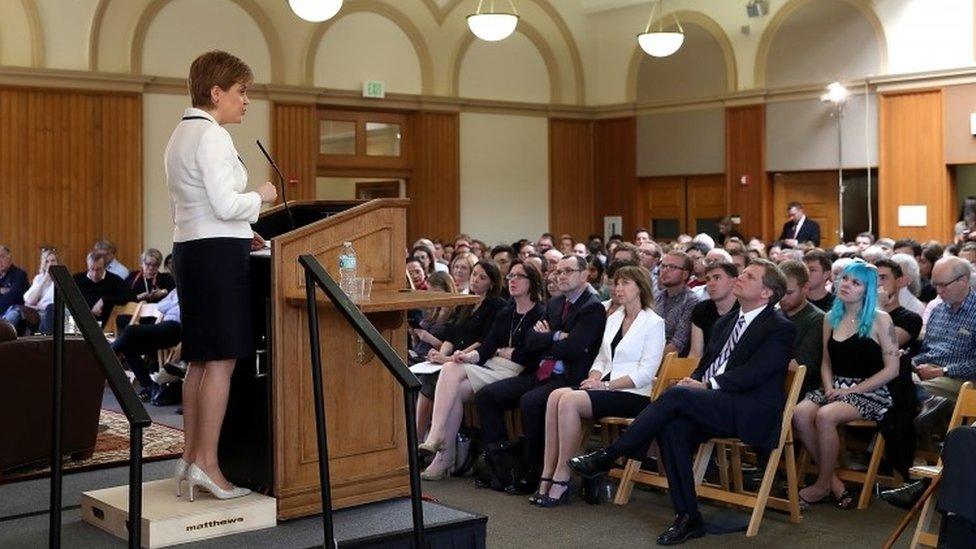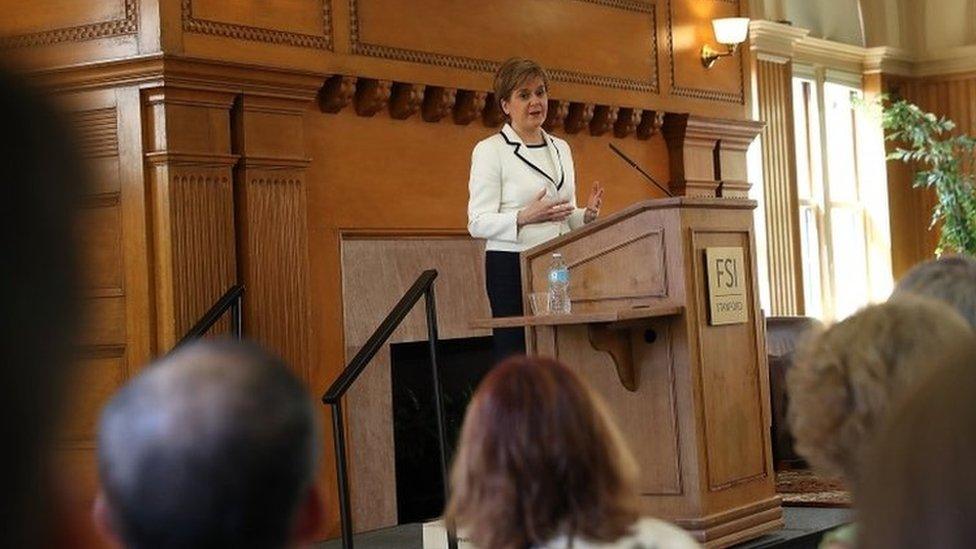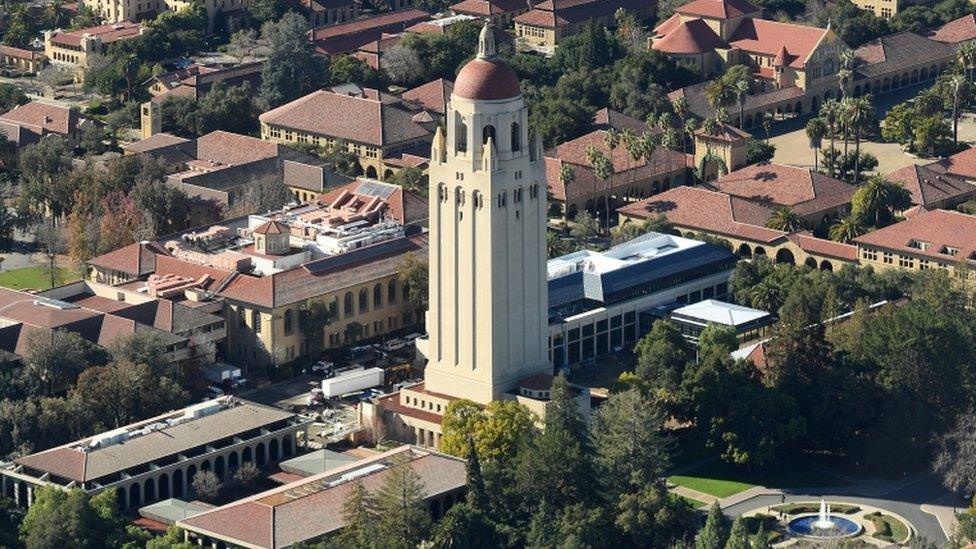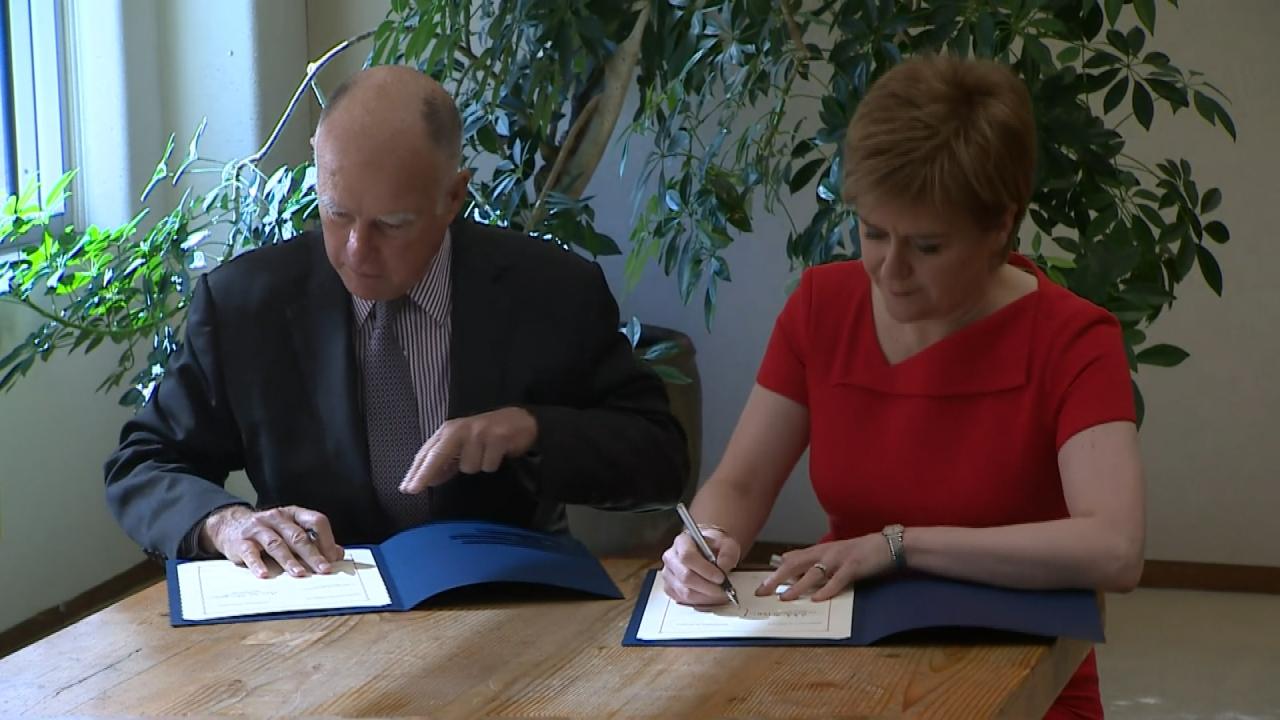Nicola Sturgeon sets out global vision for Scotland
- Published
- comments

Nicola Sturgeon used her speech to highlight the global role an independent Scotland could have
Independence would offer Scotland the best way of making a positive contribution to the world, Nicola Sturgeon has claimed.
The first minister was speaking at Stanford University in California as she continued her five-day US trip.
Ms Sturgeon also urged the UK government to recognise the "right" of Scots to decide their own future.
Opposition parties said she was trying to build support for a referendum which the majority of Scots did not want.
The Scottish Parliament last week voted to back the first minister's call for talks to take place with the UK government over a second independence referendum.
'Fairer society'
But the UK government has already declined Ms Sturgeon's request to be given the powers to hold a legally-binding independence referendum before the Brexit process is complete.
It has argued that the focus should instead be on getting the best deal for the whole of the UK in the forthcoming negotiations with the EU - with the prime minister repeatedly saying "now is not the time" for another vote on independence.

Voters in Scotland rejected independence by 55% to 45% in September 2014.
Ms Sturgeon used her speech to highlight the global role an independent Scotland could have, stressing it would remain an "open, outward-looking and inclusive" nation that would continue to welcome people from across the world.
It would also seek to "build partnerships around the world", including with governments, businesses and universities, she said.
Ms Sturgeon said the Brexit vote in June 2016 posed a "fundamental question for Scotland", saying the country now faces an "exit against our will from the largest trading block in the world, at the hand of a UK government prioritising curbs on immigration above all else".

Ms Sturgeon gave her speech at Stanford University
The alternative to this is independence, with its "opportunities and challenges", she said, claiming this would give Scotland "the freedom to be an equal partner with the other nations of the UK and Europe and with countries across the world".
The first minister added: "Independence, combined with equal partnership, is the best way for us to build a fairer society at home and to make a positive contribution to the world.
"However that is something which will be debated and discussed across Scotland as we move forward. The immediate point that the UK government must recognise is that the people of Scotland have the right to make that choice."
'Fairly certain'
The SNP leader accepted some people "understandably are reluctant" to hold another vote on the issue so soon after the first one, but also claimed Mrs May's refusal to grant permission for a second referendum was "not a sustainable position".
She added: "It is a bit of a holding position just now. There will be another referendum on Scottish independence, of that I am fairly certain."
While the legislation that created the Scottish Parliament reserved powers over constitutional issues to the UK, Ms Sturgeon argued that "is quite a vague term" and said the issue had never been tested in court.

Analysis by James Cook, BBC Los Angeles Correspondent
The first minister sketched out a political philosophy here which used to be very popular.
The vision she described at Stanford University was of an open country which uses the fruits of trade to help everyone in society.
The free movement of people and goods was, Nicola Sturgeon claimed, particularly important for a small country like Scotland.
But immigration and trade must go hand-in-hand with a more caring economic model, she argued, in a speech which cited as an example "Rhine Capitalism", external, the co-operation between workers, firms and government which produced such remarkable success for the economy of post-war Germany.
In essence Ms Sturgeon was arguing that the election of President Trump in the United States and Brexit in Europe were symptoms rather than solutions.
The extent to which voters in Scotland agree or disagree with the first minister's assessment and philosophy may play a role in determining whether or not her country eventually becomes independent.

The first minister also used the speech to set out her views on the challenges and opportunities of globalisation, migration and climate change.
The event, which was billed as discussing Scotland's place in the world, came on the second day of Ms Sturgeon's visit to California.
On Monday she signed a climate change agreement with the state's governor, Jerry Brown.
'Unwanted referendum'
Ms Sturgeon is to spend a total of five days in the US, with the aim of "promoting trade and investment, boosting tourism, sharing best practice across the public and private sector and promoting Scottish innovation and entrepreneurship".
As well as Mr Brown, she has already met senior executives from Apple and Tesla, but will not be meeting anyone from President Donald Trump's administration.
She will be in New York on Wednesday, where she will give a speech at the United Nations headquarters, before completing her trip on Friday.
Responding to Ms Sturgeon's speech, John Lamont of the Scottish Conservatives said it was a "great shame that she has chosen to use her taxpayer-funded trip to America to promote independence, and an unwanted referendum."
He added: "She may be representing the SNP in doing so - but she does not represent mainstream Scottish opinion."
Scottish Labour's James Kelly said Ms Sturgeon should use foreign trips to represent the interests of all the people of Scotland, rather than "trying to build up support for a second referendum that the majority here don't want".
And Scottish Liberal Democrat leader Willie Rennie accused Ms Sturgeon of using California as the next stop in her "global grievance tour".
- Published3 April 2017
